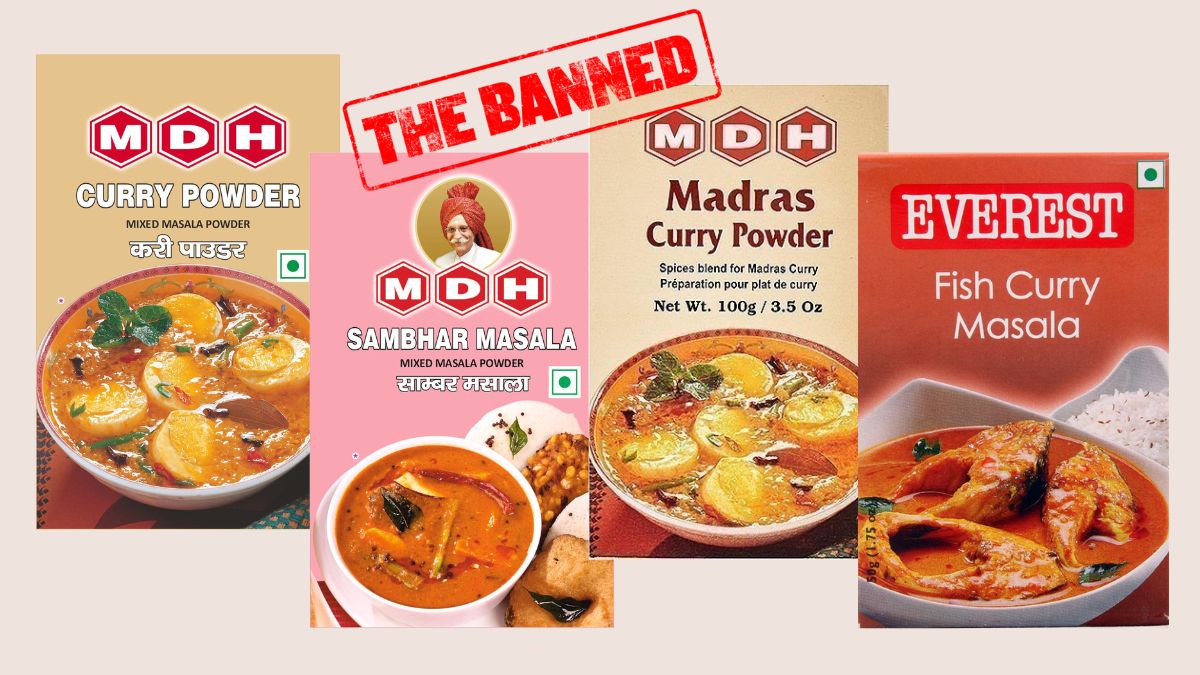How Many Indian Spices Banned? spice brands Everest and MDH
Indian spices have long been revered worldwide for their rich flavors, medicinal properties and cultural significance. However, not all Indian spices enjoy unfettered global reach. A complex web of international trade regulations, health concerns and agricultural standards have led to restrictions or bans on certain Indian spices in various countries. Understanding which spices are banned, why they are banned, and their impact on the spice trade is essential for anyone involved in the global culinary or agricultural industries.
The term “banned spices” refers to specific spices that are either completely prohibited or highly restricted for import or sale in certain countries. The reasons for these restrictions are multifaceted, often rooted in health concerns, environmental protection, or the need to maintain agricultural standards. Although Indian spices are loved globally, some have faced scrutiny and subsequent bans due to several concerns.

Why are some Indian spices banned?
Several factors contribute to the banning of certain Indian spices:
Health and safety concerns: Some spices contain compounds that are considered harmful in large amounts. For example, excessive use of certain spices can cause health problems, prompting regulatory bodies to limit their availability.
Pesticide Residues: Spices contaminated with high levels of pesticide residues may be banned in countries with strict food safety regulations. For example, the European Union has strict regulations on pesticide levels, which has led to the rejection of some spice shipments from India.
Contamination and adulteration: Cases of contamination, such as the presence of heavy metals or adulteration with harmful substances, have banned some spices. Spices mixed with non-food-grade ingredients pose significant health risks.
Environmental and Ethical Concerns: Some spices may be banned due to environmental concerns, such as the impact of their cultivation on biodiversity or the ethical considerations surrounding their production.
Although most Indian spices are safe and enjoy global trade, some are flagged for various reasons:
Fenugreek seeds: In 2011, some countries including Germany introduced E. had temporarily banned fenugreek seeds from India due to concerns over a possible link to the coli outbreak. Although the ban was eventually lifted, it highlighted the spice trade’s vulnerability to health scares.
Asafoetida (asafoetida): Asafoetida has faced bans in some countries due to concerns about its pungent odor and potential allergic reactions. Although not widely banned, it is regulated in some areas.
Turmeric with high lead content: Turmeric is a staple ingredient in Indian cuisine, but cases of high lead levels in turmeric have led to its ban in some countries. This is mainly due to contamination during the production process.
Betel nut (areca nut): While not a spice in the traditional sense, betel nut is commonly used as a mouth freshener in India. Because of its carcinogenic properties, it has been banned in numerous countries.
Papaver somniferum (Opium poppy): The seeds of this plant, called poppy seeds, are widely used in Indian cooking. However, they have been banned or restricted in countries such as the UAE and Saudi Arabia due to their association with drugs.
Banning certain Indian spices could have a significant impact on the global spice trade. India is one of the world’s largest producers and exporters of spices, and any ban could affect not only the spice industry, but also the livelihoods of farmers and traders. Additionally, these restrictions often lead to a re-evaluation of farming practices, pushing for more stringent quality control measures to prevent future restrictions.
For exporters and traders, understanding the regulations surrounding Indian spices is crucial. Different countries have varying standards, and staying compliant requires constant vigilance. As some of the main areas of concern include:
Pesticide Use: Ensuring that spices are free from harmful levels of pesticide residues is essential. This often involves adopting organic farming practices or following strict guidelines on pesticide application.
Quality Control: Regular testing of spices for contaminants such as heavy metals, toxins, and other harmful substances is necessary to meet international standards.
Traceability: Being able to trace the origin of spices and the methods used in their cultivation can help address concerns about environmental impact and ethical sourcing.
Indian spice exporters face several challenges due to the complex landscape of international trade regulations. These challenges include:
Meeting Diverse Standards: Different countries have varying standards for acceptable levels of pesticide residues, contaminants, and food safety. Keeping up with these regulations can be daunting for exporters.
Adapting to Sudden Bans: The sudden imposition of a ban can disrupt trade and lead to significant financial losses. Exporters must be prepared to adapt quickly to such changes, which may involve finding alternative markets or adjusting supply chains.
Maintaining Consistency: Ensuring that each batch of exported spices meets international standards for quality and safety is essential. Inconsistent quality can lead to the rejection of consignments and damage to a brand’s reputation.
Also Read: Hormone Therapy – A Game Changer for Menopausal Women
How the Indian Government Is Addressing These Issues
Recognizing the challenges posed by international bans and restrictions, the Indian government has taken steps to support the spice industry. Initiatives include:
- Promoting Organic Farming: The government is encouraging farmers to adopt organic farming practices to reduce reliance on pesticides and chemicals. This not only helps in meeting international standards but also appeals to the growing demand for organic products.
- Strengthening Quality Control: The Indian Spices Board has implemented stricter quality control measures and testing protocols to ensure that exported spices are free from contaminants and meet global standards.
- Exploring New Markets: To mitigate the impact of bans in traditional markets, the government is exploring new markets for Indian spices, particularly in regions with less stringent regulations.
Despite the challenges, the future of Indian spices in global trade remains bright. Demand for authentic, high-quality spices is on the rise, driven by the growing popularity of Indian cuisine and the global trend towards natural and organic products. However, the industry must continue to evolve to meet the changing landscape of international trade regulations.
support trulyindependent journalism
sale of indian spicemix products, indian spice brands everest, spice brands everest and mdh, bans sale of indian spicemix, nepal bans sale of indian
Also Read: RNA Crucial Role – The Key Player in the Evolution of Life and Modern Medicine – Breaking News
Is there a ban on Indian spices in America?
Most Indian spices are permitted in the US, but some shipments may be rejected if they do not meet FDA standards, particularly regarding contamination or pesticide residues.
Why was fenugreek banned in some countries?
E. in countries like Germany in 2011 on fenugreek seeds. A temporary ban was imposed due to a suspected link to the coli outbreak, although the ban was later lifted.
Is turmeric banned anywhere?
Turmeric has not been banned, but some shipments have been rejected in countries due to high levels of lead contamination, usually due to poor processing practices.
Which Indian spice is banned in Europe?
Some Indian spices, such as fenugreek and some shipments of turmeric, have faced temporary bans in Europe due to contamination concerns.
Can I bring Indian spices to another country?
It depends on the country and the specific species. Some countries have restrictions on certain spices, especially if they are contaminated or do not meet safety standards.
Is betel nut considered a spice, and is it banned?
Betel nut, while not a traditional spice, is used in India and is banned in many countries due to its carcinogenic properties.
For more details, visit our Privacy Policy, Disclaimer, and Terms and Conditions.
Stay connected with NH PUNJAB (Punjabi), where your news journey begins.

